
*
Follies: New Broadway Cast Recording [PS Classics PS-1105]
Between our recent two-part column examining the back catalogue of Follies cast albums and our book review of "Look, I Made a Hat," it almost feels like we've had too much Sondheim in the past month. (You can't have too much Sondheim, in my opinion, but you can have too much writing about Sondheim, can't you? Wait — my editor clearly disagrees!) The new original cast album of the current revival of Follies has now been released. We can't really leave that out of the discussion. Since I've filled this column with 10,000 or so Sondheim words recently, I will try to be briefer than I would be otherwise.
The composer has come out with an interview on Playbill.com, in which he says: "It's always dangerous to praise something you've been connected with, but I've got to say it's a really good cast album." Now, I can think of several of Mr. Sondheim's songwriting peers who see no such danger, being inclined to wildly praise any cast album, revival, or refrigerator magnet connected with any of their musicals. I don't find them indiscriminating, exactly; they simply see it as part of their job to serve as cheerleader to any and all enterprises which see fit to send royalty checks. That's fine for them, and why not?
| |
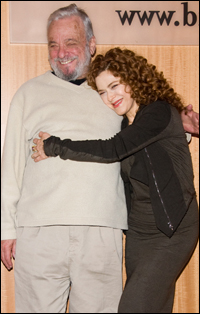 |
|
| Stephen Sondheim and Bernadette Peters at a recent CD signing. | ||
| photo by Monica Simoes |
Here, though, we have the composer himself opining that this new cast album is "really good." And I concur. Tommy Krasker of PS Classics have given us the full score interwoven with numerous segments of the libretto which — in the opinion of Krasker and Sondheim — enhance the listening experience. So we get about 107 of the 135 or so minutes as performed at the Marquis. But not precisely as performed at the Marquis. Krasker went back to the original for remembered lines from James Goldman's script that have over the years been cut; this with full permission of the rights holders. Some of these changes for the recording have subsequently been incorporated into the revival.
For those interested in such things — which means, maybe, everyone who is reading this? — Krasker has offered a detailed explanation of what he has done and how and why he did it. This can be found on the label website (www.psclassics.com). Part of what you will find there is an account of Sondheim sitting at the recording session and changing the word "pitiful" to "sorrowful." (If you don't instantly recognize this — which means you just might be normal — it comes in "The Story of Lucy and Jessie," Phyllis' Loveland number: "Jessie wants to be lacy / Lucy wants to be Jessie / That's the sorrowful précis / It's very messy." Only it's now "pitiful précis.") Sondheim's comment: "I finally figured out the right word after 40 years."
| |
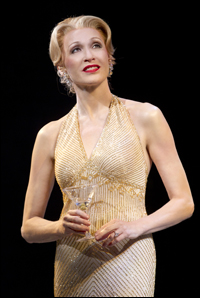 |
|
| Jan Maxwell in Follies. | ||
| photo by Joan Marcus |
The banner item, I suppose, can be considered the playing of the score. Sondheim's music — and Jonathan Tunick's orchestrations — sound wonderful, for which we can salute musical director James Moore, his 28-piece orchestra, and the fellows in the recording studio. Also very much enhancing the recording is the selective inclusion of incidental music and dialogue, with a goal of telling the listener everything he or she needs to know. (Yes, there are some listeners out there who don't know Follies beat by beat.)
This production has two very good performances — from Jan Maxwell as Phyllis and Ron Raines as Ben — plus an astonishingly wonderful one from Danny Burstein as Buddy. In years of Follies watching, the character of Buddy has always seemed unconvincing to me. Burstein's Buddy is real, all right; convincing and authentic. He sings the songs better than I've ever hoped to hear, but it's the acting that makes us — finally — actually look at Follies through Buddy's eyes.
| |
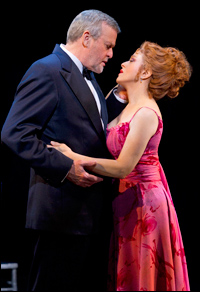 |
|
| Ron Raines and Bernadette Peters in Follies. | ||
| photo by Joan Marcus |
Listen to her now. This is a fine Sally, the sort of Sally you'd expect to get from an actress like — well, Bernadette Peters. The performance on the CD is compelling; either this is simply the magic of the recording studio or Peters has changed what she does and how she does it. While I did not intend on paying another visit to the Marquis, I wonder if perhaps I owe it to myself to see Peters once more. I need not step through and praise this one and that one yet again; I've said enough about this production. One thing that I feel should be addressed refers to a comment in the second part of the Follies cast album overview. I explained that when looking at a new production or recording of the show, I center on the four leads plus three of the ladies (Carlotta, Hattie and Stella); the rest of the characters — be they good, better, or exceptional — remain subsidiary. That changed when I attended this production, with Heidi now added to the mix. Rosalind Elias' rendition of "One More Kiss" — with Leah Horowitz as her ghost — is a crowning moment of the show at the Marquis, not only for the singing but for the way the song suddenly seems crucial to everything Mr. Sondheim and Mr. Goldman are saying through the evening. This moment is here on the CD, of course; perhaps it will give the listener a chill.
| |
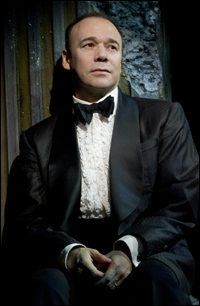 |
|
| Danny Burstein in Follies. | ||
| photo by Joan Marcus |
There's nothing more to say, except that we still have a month until this production is scheduled to pack up and move out on Jan. 22. Follies lovers have no doubt already made their pilgrimage to the Marquis, geography permitting. It took us 40 years to get a major production worthy of comparison to the Harold Prince-Michael Bennett original. If it takes another 40 years to get another one, I don't know that I'm Still Here. So I suggest that readers take advantage of this Follies while it's still on the boards, either on Broadway or in the just-announced engagement at the Ahmanson in Los Angeles starting May 3.
Visit PlaybillStore.com to buy this and other theatre-related recordings for sale.
| |
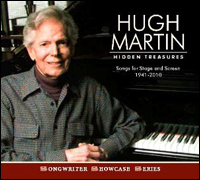 |
|
| Cover art for "Hugh Martin: Hidden Treasures" |
This is not an introductory Best of Hugh Martin CD for folks wishing to hear what some of us have been raving about all these years. ("Hugh Sings Martin," a 2006 CD from PS Classics, serves that purpose.) There is no "Boy Next Door," "Trolley Song," or "Have Yourself a Merry Little Christmas." Just twenty-nine nonprofessional recordings, demos and such. Songs from Best Foot Forward, Look Ma, I'm Dancin', Make a Wish, and High Spirits, as well as unfinished musicals Here Come the Dreamers, Tattered Tom and Wedding Day (from Carson McCullers' "Member of the Wedding"). Several film scores, too. And "I Can't Get Used to These Clothes," a 1953 song for Eddie Fisher's nightclub act to which Martin invited young lyricist Harnick to contribute.
Which is why Harnick is present, although he has provided not a mere anecdote but a comprehensive 13-page appreciation of Martin-as-lyricist. This in an 84-page booklet which accompanies the CD. Sondheim writes a brief-but-admiring introduction; Mark Eden Horowitz of the Library of Congress discusses Martin the composer; Feinstein describes Martin's vocal style — and he was quite a singer/arranger; Ted Chapin discusses the relationship with Richard Rodgers. (Rodgers immediately recognized Martin's talents as a vocal arranger, and got him his first assignment as a composer, on the musical Best Foot Forward.) And there's plenty more, including a song-by-song description of the contents. Photos, too.
Martin, who died in March at the age of 96, was closely involved in the creation of this CD. His enthusiastic zest for everything in life, most especially music, is much apparent. For fans of Hugh — old fans and brand new ones — "Hugh Martin: Hidden Treasures" is a deluxe candy box, crammed with savory delights.
(Steven Suskin is author of the recently released updated and expanded Fourth Edition of "Show Tunes" as well as "The Sound of Broadway Music: A Book of Orchestrators and Orchestrations," "Second Act Trouble" and the "Opening Night on Broadway" books. He also pens Playbill.com's Book Shelf and DVD Shelf columns. He can be reached at [email protected].) *
Visit PlaybillStore.com to view other theatre-related recordings for sale.
View highlights from the show:









